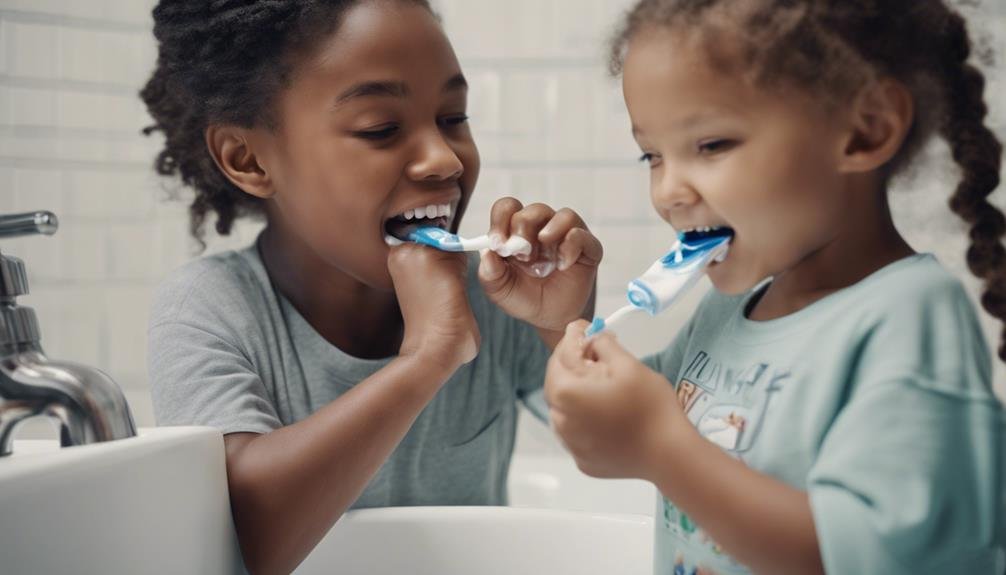"Cherishing Little Steps - A Haven for Baby and Family Journeys"
Early Childhood Caries: Prevention Tips for Parents
As a parent, you may not realize the impact your habits have on your child's oral health. Simple actions like sharing utensils or allowing excessive sugary drinks can set the stage for early childhood caries.
By understanding the preventive measures and making small changes in your daily routine, you can safeguard your child's teeth and set them up for a lifetime of healthy smiles.
Let's explore some effective strategies to keep those little teeth strong and cavity-free.
Key Takeaways
- Proper oral hygiene from infancy prevents early childhood caries.
- Limiting sugary snacks and drinks reduces cavity risk.
- Regular dental check-ups aid in early detection and prevention.
- Fluoride treatments and sealants help safeguard children's teeth.
Importance of Baby Teeth

Understanding the important role that baby teeth play in your child's overall oral health is key for ensuring their well-being in the long run. Baby teeth, also known as primary teeth, are important for the proper development of your child's mouth and jaw. These tiny teeth aren't just temporary; they serve as space holders for the permanent teeth that will eventually come in. Neglecting the care of baby teeth can lead to long-term consequences, such as misalignment of permanent teeth and potential speech development issues.
The development of baby teeth is an essential process that sets the foundation for your child's oral health as they grow. Ensuring that baby teeth are healthy and properly cared for can prevent future dental problems. Regular dental check-ups, proper oral hygiene practices, and a balanced diet all contribute to the longevity of your child's baby teeth and have a direct impact on their overall oral health in the long term. Remember, taking care of baby teeth now sets the stage for a lifetime of healthy smiles.
Healthy Diet Choices
To promote healthy teeth and overall well-being, making wise dietary choices is important for your child's oral health. Here are some tips to help you guarantee your child's diet supports their dental health:
- Nutritious snacks: Encourage your child to snack on healthy options like fruits, vegetables, cheese, and nuts. These snacks not only provide essential nutrients for their overall health but also help maintain good oral hygiene by avoiding sugary snacks that can lead to tooth decay.
- Regular meals: Establishing a routine for regular meals can help reduce the frequency of snacking, which can be detrimental to your child's teeth. Make sure these meals are balanced and include a variety of food groups to support their overall health.
- Consider dental sealants: Talk to your child's dentist about dental sealants, which are thin protective coatings applied to the chewing surfaces of molars to prevent cavities. This preventive measure can be especially beneficial for children prone to tooth decay.
Limit Sugary Drinks

Encouraging your child to limit sugary drinks can greatly contribute to their oral health and prevent early childhood caries. Sugary beverages like sodas, fruit juices, and energy drinks are major culprits in tooth decay. The sugars in these drinks feed the bacteria in your child's mouth, leading to acid production that weakens the enamel and causes cavities. By reducing your child's intake of sugary drinks, you can help safeguard their teeth.
Instead of sugary drinks, opt for water as the primary beverage choice for your child. Water not only keeps your child hydrated but also helps rinse away food particles and sugars that can lead to decay. Encouraging regular water consumption throughout the day can promote saliva production, which aids in neutralizing acids and protecting teeth.
Additionally, consider dental sealants as a preventive measure. Dental sealants are thin protective coatings applied to the chewing surfaces of molars to shield them from decay-causing bacteria. By limiting sugary drinks, promoting water consumption, and considering dental sealants, you can take proactive steps to protect your child's oral health.
Proper Oral Hygiene Routine
Developing a consistent and effective oral hygiene routine is important for maintaining your child's dental health and preventing early childhood caries. Here are three essential tips to help you establish a successful routine:
- Master the Brushing Technique: Use a soft-bristled toothbrush and gentle circular motions to clean your child's teeth thoroughly. Make sure they brush for at least two minutes, reaching all surfaces of the teeth.
- Incorporate Fluoride Toothpaste and Mouthwash: Fluoride toothpaste helps strengthen tooth enamel and prevent cavities. Use a rice-sized amount for infants and a pea-sized amount for older children. Supervise brushing to avoid swallowing. Mouthwash can be used for children over a certain age; consult with your dentist for recommendations.
- Don't Forget Flossing: Flossing is important for removing plaque and food particles between teeth that brushing alone can't reach. Begin flossing as soon as your child has two teeth that touch. Encourage and assist them until they can do it independently.
Avoid Sharing Utensils

Sharing utensils can increase the risk of transmitting harmful bacteria that can contribute to early childhood caries. When you share utensils with your child, you are also sharing the bacteria in your mouth, which can lead to oral health issues. To prevent bacteria growth and protect your child's teeth, it is crucial to avoid sharing utensils.
Here is a table highlighting the risks of sharing utensils:
| Risks of Sharing Utensils |
|---|
| 1. Transmits harmful bacteria |
| 2. Increases the risk of early childhood caries |
| 3. Hampers oral health maintenance |
Regular Dental Check-ups
Regular dental check-ups play an important role in maintaining your child's oral health and preventing potential issues like early childhood caries. These routine visits are essential for early detection and intervention, ensuring your child's teeth and gums stay healthy. Here are three key reasons why regular dental check-ups are essential:
- Detection of Early Signs: Regular visits allow the dentist to spot any early signs of dental problems such as cavities or gum disease before they escalate, helping to prevent more significant issues in the future.
- Professional Cleaning: Dental cleanings during check-ups help remove plaque and tartar buildup that regular brushing and flossing might miss. This preventive measure reduces the risk of tooth decay and gum disease.
- Addressing Dental Anxiety: Regular visits help familiarize your child with the dental environment, easing any dental anxiety they may have. Building a positive relationship with the dentist from a young age can alleviate fears and promote good oral health habits.
Fluoride for Strong Teeth

To maintain your child's oral health and guarantee strong teeth, incorporating fluoride is vital for ensuring tooth decay prevention and promoting dental strength. Fluoride provides numerous advantages in terms of oral care. It aids in remineralizing the enamel, making teeth more resistant to acid attacks that can result in cavities. You can guarantee your child receives fluoride through various means, such as fluoride toothpaste and fluoridated water.
Consider the following table for a quick overview of fluoride benefits and provision:
| Fluoride Benefits | Fluoride Provision |
|---|---|
| Strengthens enamel | Fluoride toothpaste |
| Prevents cavities | Fluoridated water |
| Promotes dental health | Professional treatments |
| Fights acid attacks | Fluoride supplements |
| Supports oral hygiene | Fluoride varnish |
Timing of First Dental Visit
Considering your child's oral health, scheduling their first dental visit at an early age is essential for establishing a solid foundation for their dental care journey. This initial visit not only allows the dentist to monitor your child's dental development but also helps in building a positive and familiar relationship with oral care professionals.
- Early Introduction: Introducing your child to the dental environment early helps in acclimatizing them to the sights and sounds of the dental office, reducing potential dental anxiety in the future.
- Preventive Education: The first dental visit provides an opportunity for parents to learn about proper oral hygiene practices, teething discomfort management, and preventive measures tailored to your child's specific needs.
- Early Intervention: Detecting any signs of dental issues early on, such as cavities or alignment problems, allows for prompt intervention, preventing the progression of potential problems and ensuring your child's oral health.
Pacifier and Thumb Sucking
Using a pacifier or sucking their thumb is a common habit among young children that can impact their dental health. While these oral habits may provide comfort and serve as self-soothing techniques, prolonged use can lead to dental issues. The constant pressure from sucking on a pacifier or thumb can affect the alignment of teeth and the development of the jaw.
As a parent, it's crucial to be mindful of your child's reliance on pacifiers or thumb sucking. Encouraging other self-soothing methods or gradually limiting the use of pacifiers can help prevent dental problems in the future. Try offering a favorite toy or blanket as an alternative comfort item to help your child break the habit.
If you notice that your child is using a pacifier or sucking their thumb excessively, consider speaking with their pediatric dentist for further guidance. They can provide tailored advice to address your child's specific needs and offer strategies to support healthy oral development. By being proactive and attentive to your child's oral habits, you can help safeguard their dental health in the long run.
Lead by Example
If you're concerned about your child's oral habits, leading by example can positively influence their behavior and choices. Children often mimic the behaviors they observe in adults, making your role modeling important in establishing healthy habits.
Here are three ways you can lead by example to promote good oral health practices for your child:
- Regular Dental Visits: Demonstrating your commitment to attending dental check-ups regularly can show your child the importance of oral health care. Taking them along to your appointments can help familiarize them with the dental environment and reduce any anxiety they may have.
- Consistent Oral Hygiene Routine: Brushing and flossing your teeth alongside your child not only ensures your own oral health but also sets a routine for them to follow. Make it a fun activity by turning it into a family affair.
- Healthy Dietary Choices: Opting for nutritious snacks and limiting sugary treats in your household can encourage your child to make similar choices. Show them that eating fruits, vegetables, and dairy products can benefit both their overall health and their teeth.
Frequently Asked Questions
Can Early Childhood Caries Be Prevented Completely With Proper Oral Hygiene and Diet Choices?
You can't prevent early childhood caries completely, but with proper oral hygiene, fluoride, and smart diet choices, you can greatly reduce the risk. Consistent brushing, limited sugary snacks, and regular dental check-ups are key.
Are There Any Natural Remedies or Alternative Treatments for Early Childhood Caries?
When looking for natural remedies or alternative treatments for early childhood caries, consider holistic approaches like herbal solutions. Preventive measures such as dietary choices play an important role. Consult with professionals for personalized advice.
How Can Parents Address the Emotional Impact of Dental Procedures on Their Young Children?
You might feel overwhelmed by your child's emotions during dental procedures. Remember, your support matters. Use comforting routines, distraction techniques to ease anxiety. Stay calm, offer reassurance. Your presence and coping strategies can make a huge difference.
Are There Any Specific Dental Products or Tools That Are Recommended for Young Children to Prevent Early Childhood Caries?
To prevent early childhood caries, parents should use child-friendly dental products like fluoride toothpaste. Encourage good oral habits by supervising brushing. Make it fun and rewarding to instill proper dental care from a young age.
How Can Parents Help Children Who Have a Fear of Visiting the Dentist Overcome Their Anxiety?
When your child fears the dentist, remember you're not alone. Therapy techniques like gradual exposure and positive reinforcement can ease anxiety. Your support and encouragement make a difference in helping them overcome this fear.
Conclusion
To sum up, remember that prevention is better than cure when it comes to early childhood caries. By following these tips, you can help your child maintain a healthy smile and avoid dental decay.
Remember, 'an ounce of prevention is worth a pound of cure.' So, start implementing these simple strategies today to set your child up for a lifetime of good oral health.
Your little one's smile will thank you!


